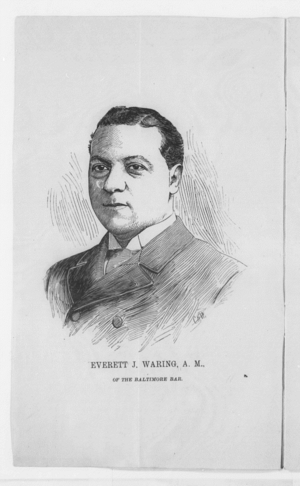Everett J. Waring facts for kids
Quick facts for kids
Everett J. Waring
|
|
|---|---|
 |
|
| Born | May 22, 1859 |
| Died | September 2, 1914 (aged 55) |
| Nationality | American |
| Occupation | Attorney, banker |
Everett J. Waring (born May 22, 1859 – died September 2, 1914) was a very important lawyer. He made history in 1885 by becoming the first Black person allowed to practice law in Maryland. He also argued cases in the highest courts, including the Supreme Court of the United States.
Waring helped people who were treated unfairly. For example, he represented workers from Navassa Island who faced harsh conditions. He also worked with the Brotherhood of Liberty, a group that fought for the rights of Black people. Besides law, he helped start the Lexington Savings Bank, a bank owned by Black people. He also worked as a newspaper editor and even became a minister.
Contents
Early Life and Family
Everett J. Waring was born in Springfield, Ohio, on May 22, 1859. His parents were Malvina C. and James S. Waring. His father, James, was a teacher and a principal at schools for African American children in Ohio.
Everett was one of five children. His siblings included Clarence, Addie, Ovella, and Nora May. His brother Clarence later became a doctor.
Education and Early Career
Everett Waring was a bright student. He finished Columbus High School in 1877. After graduating, he worked as a teacher in public schools in Columbus and Springfield, Ohio. A year later, he became a principal of schools for Black children in Columbus.
In 1882, he started working at the United States Department of the Interior in Washington, D.C. At the same time, he studied law at Howard Law School. He graduated with honors from Howard Law School in 1885. He later earned a Master's Degree in 1893.
A Career Fighting for Justice
Waring first became a lawyer in Washington, D.C., in 1885. In 1886, he moved to Baltimore, Maryland. He was encouraged by Reverend Harvey Johnson to become the first Black lawyer in Maryland. He joined the Brotherhood of Liberty to help fight for the rights of Black people.
One of his important goals was to make laws fair for everyone. For example, he worked to change a law so that all unmarried women, regardless of their race, could get financial help from the fathers of their children. Even though he didn't win the case right away, the law was changed the next year to include all women. He opened his own law office and helped many people in the African American community.
Waring took on a very important case involving workers from Navassa Island. He and another lawyer, Joseph S. Davis, represented three African American men. These men were miners who worked for a company on the island. They were promised good jobs but faced terrible conditions and low pay.
The workers, many from Baltimore, were tricked by a company to go to Navassa Island. They were told to dig for guano, which is seabird waste used as fertilizer. The workers said they were treated like "literal slavery." They were "shackled and beaten and forbidden to leave the island," according to a news story. The company also charged them too much for food and other things, leaving the workers in debt.
Five officers died during a riot on the island. Jones and 17 other men were charged with murder. Waring and Davis fought for these men in several courts. The case, Jones v. United States, went all the way to the Supreme Court in 1890. The court decided that U.S. courts had the right to hear the case. Jones and two other men were found guilty and sentenced to death.
Waring and other leaders worked hard to save the men. They convinced President Benjamin Harrison to change their sentence to life in prison instead of execution. This case was historic because Waring and Davis were the first African American lawyers to argue a case in the nation's Supreme Court.
Other Contributions
Everett Waring was a respected leader in the African American community. He helped start the Lexington Savings Bank. He also invested in real estate, owning many houses. Later, he faced some financial problems, which led him to leave Baltimore.
He also worked as a newspaper editor and publisher. He edited the Sunday Capital in Springfield, Ohio. He also started and published the Afro American newspaper in Columbus, Ohio. In 1897, he became a minister in the African Methodist Episcopal Church. He continued to practice law in Ohio and later in Philadelphia, Pennsylvania.
Personal Life
Everett Waring married Katie E. Johnson on January 12, 1887. They had four children: Alice, Nora, Kate, and Walter. He was a member of the Union Baptist Church and later the St. John's African Methodist Episcopal Church.
Waring passed away on September 2, 1914. He and his wife, Kate, are buried at the Eden Cemetery in Collingdale, Pennsylvania.
Legacy
Everett J. Waring left an important mark on history. He was a pioneer for Black lawyers and a strong voice for justice.
In 1985, a law society was named after him and another important African American attorney, Juanita Jackson Mitchell. This group, called the Everett J. Waring / Juanita Jackson Mitchell Law Society of Howard County (WMLS), helps judges and lawyers and works to improve the community.
Waring is also remembered on a historic marker at the Union Baptist Church in Baltimore.
See also
- Ada Copeland King, one of his clients
- List of first minority male lawyers and judges in Maryland
 | Emma Amos |
 | Edward Mitchell Bannister |
 | Larry D. Alexander |
 | Ernie Barnes |

